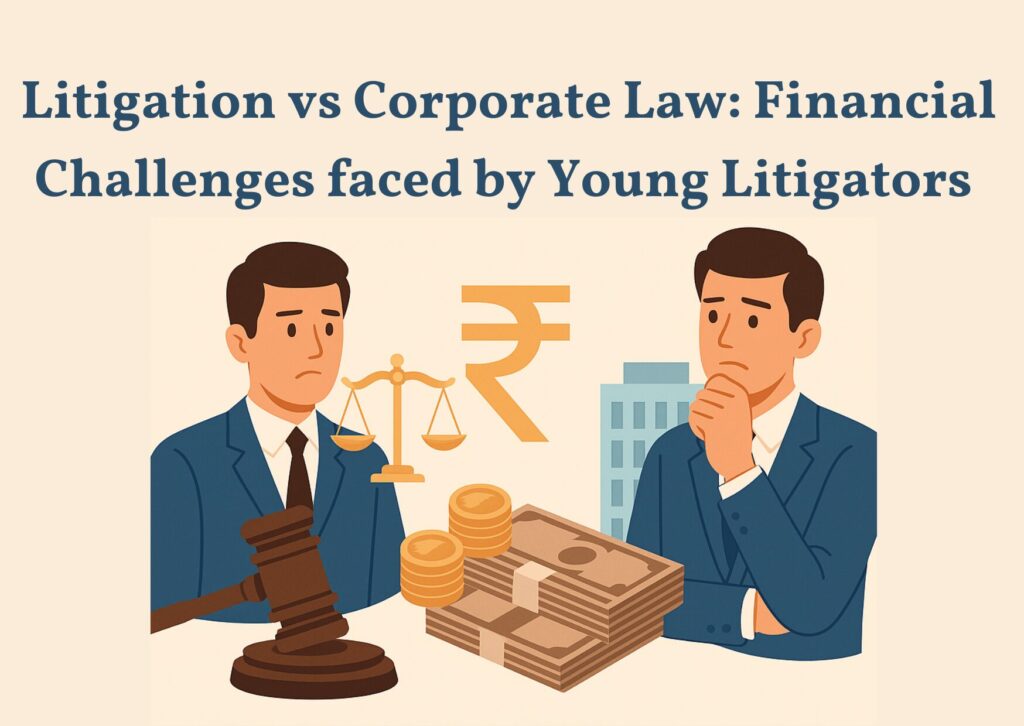
Table of Contents
Introduction
You step out of law school with a degree in one hand and a dream in the other. But a few weeks into your litigation journey, reality hits—low stipends, long hours, and rent that won’t pay itself. Every year, countless passionate law graduates are drawn to the intellectual stimulation of courtrooms and the desire to make a difference. The road to a successful litigation career is often paved with financial hurdles. This article explores the monetary challenges faced by young litigators and practical ways to navigate them.
The Reality of Junior Advocate Salaries in India
Tier-1 Cities
In metro cities like Delhi, Mumbai, or Bengaluru, junior advocates typically earn between ₹10,000 to ₹30,000 per month, though stipends can be as low as ₹5,000. While these cities offer broader exposure and opportunities, the high cost of living often cancels out the financial advantage. In contrast, corporate law firms in the same cities offer a monthly remuneration of more than ₹1 lakh per month to freshers. The allure of litigation often comes with a substantial initial financial trade-off.
Tier-2 and Tier-3 Cities
In places like Patna, Bhopal, or Allahabad, the starting income of junior advocates ranges from ₹5,000 to ₹15,000. The lower cost of living is a slight relief, but the financial pressure persists, especially for those without familial support or savings.
Why Do Junior Litigators Earn Less?
The difference in earnings between litigators and corporate lawyers boils down to organizational structure and revenue flow. Corporate lawyers often work in well-structured environments with high-value, recurring clients. Young litigators, on the other hand, are essentially self-employed. Their income depends on building a reputation, attracting clients, and gaining trust—a process that takes time.
However, it is important to note that while the starting salaries in litigation might be lower, the long-term earning potential for those who persevere and become successful litigators can be very high. The initial lower salary can be viewed as an investment period during which young lawyers gain the necessary expertise, experience, and professional network to eventually attract higher-paying clients and command significant fees for their services.
The Weight of Student Loans
With the rising cost of legal education, many young lawyers graduate with significant debt. Government law colleges might charge ₹10,000 to ₹50,000 per year, but NLUs and private law schools can cost anywhere from ₹1.7 lakh to ₹10 lakh annually. The hostel fees, books, and living expenses, intensify the financial strain even further.
Managing Money During the Initial Years
Surviving financially in litigation requires a disciplined approach to budgeting and expense tracking. One popular method is the 50/30/20 rule: 50% for needs, 30% for wants, and 20% for savings and debt repayment. Creating a realistic monthly budget, setting up an emergency fund, and prioritizing high-interest debt repayment are crucial steps.
Ethical Ways to Supplement Income
While sticking to Bar Council of India guidelines, young lawyers can ethically supplement their income:
- Freelance Legal Writing: Contribute to legal blogs, law firm websites, or research portals.
- Editing & Proofreading: Offer services to legal journals and academic writers.
- Teaching: Take part-time lectures at law colleges or run online classes.
These roles enhance skills and build professional credibility, all while supporting financial stability.
Building a Sustainable Litigation Practice
Mastering Legal Skills
Success in litigation starts with mastering the basics—legal research, drafting, procedural laws, and court etiquette. Continuous learning and mentorship from seniors play a crucial role in building competence and confidence.
Senior Advocate Shri Ashok Chitale, in an interview with Legally Flawless, emphasized the mantra for success in litigation: “study, study, and study.” According to him, there are no shortcuts in the legal profession. He further stressed the importance of mastering the case file and legal propositions, rather than obsessing over the result. Performance, not money, should be the ultimate goal.
In yet another interview with Legally Flawless, Senior Advocate Shri Rajshekhar Govilkar adds that success in law comes from continuously building legal knowledge, mastering the language of the courts, and knowing your audience. He emphasizes reading judgments carefully, understanding the mindset of the bench, and constantly improving one’s command over language and courtroom delivery
Client Communication & Reputation
Clients value clarity, honesty, and professionalism. Maintaining realistic expectations and effective communication are key to client retention and referrals. Your reputation is your most valuable currency.
Networking
Attending bar events, legal seminars, and networking with senior advocates and peers helps build visibility and trust. These connections often lead to mentorships, client referrals, and new opportunities.
Litigation: A Long-Term Game
As experience and credibility grow, so does the earning potential. Senior litigators can command substantial appearance fees. Many senior counsels earn significantly more than their counterparts in corporate law. Beyond the monetary gains, litigation offers intellectual satisfaction, diversity of work, and a profound sense of purpose.
Making the Right Career Decision
Each young lawyer must assess their financial situation, risk tolerance, and personal aspirations. While litigation offers long-term rewards, some may find more immediate financial stability in corporate law, in-house roles, or public sector jobs. The decision should balance passion with practicality.
Conclusion
Litigation is not for the faint-hearted, especially in the early years. But for those who endure, it promises not only financial success but also immense personal fulfillment. With sound financial planning, a commitment to continuous learning, and the right professional network, young lawyers can overcome the initial obstacles and carve a successful path in litigation.
All efforts are made to ensure the accuracy and correctness of the information published at Legally Flawless. However, Legally Flawless shall not be responsible for any errors caused due to oversight or otherwise. The users are advised to check the information themselves.


